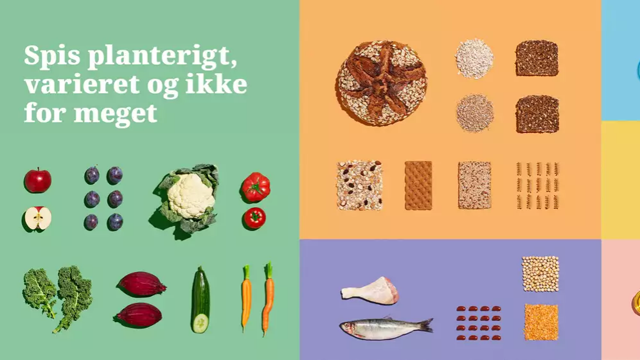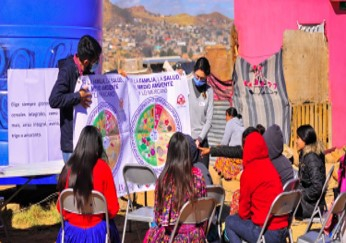For decades, dietary guidelines have provided a compass for healthy diets. Governments around the world use this instrument to promote good nutrition and health among their populations, tailoring recommendations to the local food context and culture. Like many other things, dietary guidelines have evolved over time to keep pace with a changing world. A recent webinar, co-organized by the Coalition of Action on Healthy Diets from Sustainable Food Systems for Children and All (HDSFS)[1] and the Scaling Up Nutrition (SUN) Movement Secretariat, with generous support from the Government of Switzerland, highlighted a major shift in how these guidelines are crafted. UN-Nutrition, including some of its constituent Member Agencies and as a collective, plays an active role in both the Coalition and the SUN Movement, helping to ensure coherence between these two streams of multi-stakeholder nutrition activity.
A timely topic of wide appeal
The “Sustainability in food systems based dietary guidelines: powering change for NutritiON” webinar attracted over 200 participants from 82 countries and a diversity of speakers across regions and constituencies. Contributing to its draw, is the massive overhaul of food systems that countries are undertaking as they seek to accelerate progress towards the Sustainable Development Goals and face the triple planetary crisis of pollution, climate change and biodiversity loss. The webinar took place a few days after the Summit of the Future and the release of the 2024 Gatekeepers Report which warns that, “climate change will mean 40 million additional children will be stunted, and 28 million additional children will be wasted,” by 2050. Increasing awareness that unhealthy diets are one of the leading drivers of the global disease burden is drumming up further interest in dietary guidelines, including among circles beyond the immediate nutrition community. What we eat, where it comes from, the way it is produced, its journey to our plates, as well as how it affects our health and our planet’s ability to continue yielding our food has never been more important.

Nancy Aburto from the Food and Agriculture Organization of the United Nations (FAO) framed the discussion, by reassuring participants that “there are opportunities abound to support actions that deliver the double dividend.” Dr Aburto was well-positioned to moderate the discussion in view of the multiple hats she wears. In addition to her role as Deputy Director of the Food and Nutrition Division at FAO, Dr Aburto is a member of the HDSFS Steering Committee and Secretariat and serves on the SUN Movement Executive Committee.
With novelty comes potential to increase impact
Ana Islas Ramos, a nutrition officer at FAO, provided a sneak preview of a new methodology for dietary guidelines to be launched later this year. This latest iteration is anchored in a food systems approach, with entry points for integrating environmental sustainability throughout the six-stage process. “If we purposefully consider environmental sustainability in dietary guidelines, the environmental impact would be much higher,” Ms Islas Ramos explained. Data suggests that compliance with current food-based dietary guidelines could reduce greenhouse gas (GHG) emissions by approximately 13% and premature mortality by 15%.[2] The positive impact on climate-relevant outcomes could triple by integrating environmental sustainability considerations into dietary guidelines.
In addition to being a thought leader in this arena, FAO is also a custodian of knowledge. It boasts a repository of dietary guidelines from 100 countries, including 27 which have included environmental sustainability criteria according to a recent survey conducted by FAO. Making this information available can help foster peer learning and accelerate the uptake of good practices in response to the growing demand for support on this sustainability frontier.
The country examples attest that the integration of sustainability considerations is possible. Furthermore, the Mexican guidelines introduced last year take into account all three dimensions of sustainability (including economic and social), not just environmental criteria. For example, the new healthy and sustainable ‘plate of food’ promoted in the guidelines is mainly composed of plant-based foods, with low environmental impact, that are known and frequently consumed by the Mexican population. Impact assessment modeling comparing compliance with Mexico’s new dietary guidelines to the average Mexican diet indicated that GHG emissions could fall by 34% plus a 21% savings in the cost of diet.
A strong foundation in science
Jacob Juel Christensen, a researcher from the University of Oslo, brought insights from the Nordic Nutrition Recommendations (NNR), published in 2023. Commissioned by the Nordic Nutrition Council, the recommendations have been rolled out in all eight countries of the region (Denmark, Estonia, Finland, Iceland, Latvia, Lithuania, Norway and Sweden) and are informing the development of country specific food-based dietary guidelines that are environmentally friendly, with scope to impart learnings to other contexts.

One of the virtues of the NNR is their rooting in robust evidence. Dr Christensen explained how the process to develop these recommendations engaged as many as 231 international multidisciplinary scientists, leveraging a multitude of systematic reviews and original studies as well as expertise from United Nations agencies, such as FAO and the World Health Organization (WHO). The NNR presentation also illustrated the vast range of applications from food labelling to fortification and supplementation policies, public food procurement, national surveillance and health services, among others. There is also potential to use these recommendations as an input for FAO’s modelling tool (DietSolve) that is currently in the makings to inform the formulation of dietary guidelines in other countries.
Additional takeaways
All the speakers, as HDSFS Coalition members, highlighted the importance of employing an evidence-based and consultative approach for formulating dietary guidelines. They encouraged the engagement of multiple sectors and stakeholder groups, and the need to do so from the outset. Dr Christina Vogel from City University in London, United Kingdom, emphasized that integration across multiple government departments is crucial, noting that as many as sixteen departments are somehow connected to food systems in England and thus warrant a seat at the table when developing dietary guidelines. Mark Atuahene, Principal Technical Officer at Ghana’s Ministry of Health and HDSFS Steering Committee member, also spoke to the value of engaging local governance structures, such as traditional authorities, who are powerful change agents. In Ghana, the process engaged four United Nations agencies (FAO, the United Nations Children’s Fund, the World Food Programme and WHO) alongside the government, academia and research institutes, while civil society has played an instrumental role in their implementation. Mishel Unar, from Mexico’s National Public Health Institute (Instituto Nacional de Salud Pública) went a step further pointing to the need for stakeholder engagement to be free of conflicts of interest.
Dr Unar also spoke to the centrality in applying the gender lens. Furthermore, Ghana’s guidelines urge citizens to read the nutrition information in food labels while Mexico recommends enjoying food within the family context. The adaptation of dietary guidelines to the country setting was another recurring theme, a practice linked both to the cultural identity of food and local availability. This has the potential to confer benefits for economic, environmental and social sustainability.

Looking ahead
Dietary guidelines are just one lever that can be used to shift dietary trends towards healthier and more sustainable choices. The pivot towards a food systems approach is not merely a trend. It’s a response to the pressing need to make food systems more sustainable, so they deliver healthy diets for all. “If we don’t have environmental protection, we won’t have nutritious food,” warned Mr Atuahene.
The experiences of Ghana, Mexico and the Nordic countries are inspiring examples of change. All the panelists, including Dr Vogel of City University in London, are engaged in the HDSFS, demonstrating their commitment to drive transformation on these multiple interconnected fronts. While this sometimes involves tradeoffs, diet impact assessment models (like the one developed by the WHO Regional Office for Europe[3]) can simulate the economic, environmental and health repercussions of eating patterns at the macro level. As a result, countries will be better equipped to make tricky but evidence-based decisions.
Joanne Raisin, the new Director of the SUN Movement Secretariat, reaffirmed the Movement’s commitment to supporting countries on this journey in her closing remarks. Milestones in 2025 like the Paris Nutrition for Growth Summit, the World Health Assembly, the UN Food Systems Summit Stocktaking Moment+4 and the SUN Global Gathering present opportunities to push for collective action toward shared goals. Considering that people (when they can) typically consume multiple meals a day and the 8.2 billion people on this planet, every bite counts.
Click here to view the recording of the webinar
Endnotes
[1] HDSDS is one of the 30 coalitions of action assembled through the UN Food Systems Summit in 2021. It aims to catalyze coordinated actions across food systems, for collective impact on healthy diets from sustainable food systems, to ensure healthy diets for all. Nearly 40 countries are part of the Coalition, which are joined by multiple partner entities, ranging from the UN, research and academic institutions and civil society organizations.
[2] Springmann, M., Spajic, L., Clark, M.A., Poore, J., Herforth, A., Webb, P., Rayner, M. & Scarborough, P. 2020. The healthiness and sustainability of national and global food based dietary guidelines: modelling study. BMJ, 15(370): 2322. https://doi.org/10.1136/bmj.m2322
[3] https://www.who.int/europe/publications/i/item/WHO-EURO-2023-8349-48121-71370



